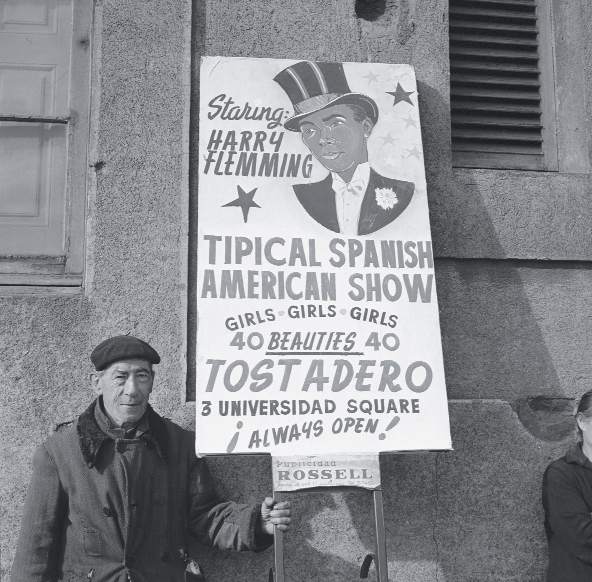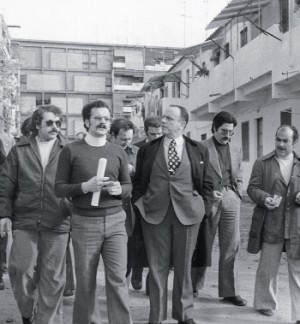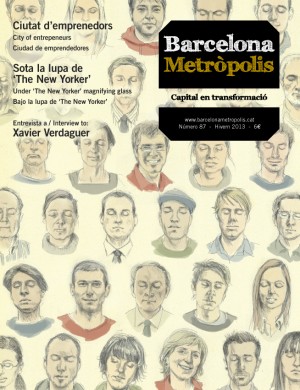The articles of the Fifties depict a defeated and vulgar country, whose only saving grace is its Mediterranean exoticism. They crystallise the myth of the Barcelona good life, driven by disorder, heat, the bohemian lifestyle, unpunctuality, sex and, in general, a laid-back, dirty and cultureless carpe diem. There is an underlying sadness, silence.

© Nat Farbman / Time & Life Pictures / Getty Images
Articles from the Fifties reveal a defeated and down-at-heel country. In the photo, a billboard advertising a “Tipical Spanish American Show” intended for sailors of the US Sixth Fleet, in January 1952.
The 1955 article is penned by Joseph Wechsberg, writer, journalist and Czech musician, and a well-known anti-Nazi fighter as of the 1930s. Parliamentary secretary of the Czech Jewish Party and defender of the Sudetenland cause in the United States, Wechsberg adopted US citizenship at the beginning of the Second World War and returned to Europe with the North American troops in 1943 as a war correspondent. After the conflict he worked for the War Crimes Commission and wrote The Murderers Among Us (1967), in which he unmasked former Nazi officers hiding out in Latin America or conveniently suffering from memory loss in Berlin. Hardly light reading.
However, Wechsberg’s article has little to do with Mannes’s. It is not political, and not even cultural in the broadest sense. It is a very entertaining caricature of a Viennese opera company that is premiering a Mozart and a Wagner in the Liceu. The difference between the definitions of Barcelona by Mannes and Wechsberg are worth mentioning, as the latter writes: “Barcelona is not only the second-biggest city in Spain but the noisiest; the noisiest part of Barcelona is the old Gothic Quarter, which is cut through by the Rambla, the city’s most picturesque thoroughfare.”
The rest of the long article is an elaboration on this theme. If Mannes read it she would have concluded that the “levelling” process orchestrated by the regime – which she mentions in her 1944 article – had reached its objectives very successfully. The erudite and modern city, which had tapped into the spiritual and material progress of the west, has become a den of corruption and slovenliness; the hotel room is like a monk’s cell, and the conversations and partying into the wee small hours lilting in from the Rambla preclude any possibility of some shut-eye for the prima donnas and the directors lodged at the Hotel Oriente.
The citizens of Barcelona are soccer-crazy and bullfight-crazy; apparently they are opera-crazy, and although many do not actually frequent the Liceu they do talk about the highlights. The singers, so used to Vienna, are homesick – the baritone is fed up of fish three times a day – and they catch colds from so much nightlife and so little rest. They complain incessantly: what an uncivilised country! The city lives by night: the shops close after midnight and do not open till noon the next day; performances begin at ten in the evening, even though the venue is still empty, although people trickle in; the intermissions are longer to give people time to hold long conversations and so that the women can show off their colourful dresses; and the technicians and extras, once the performance is over, after two in the morning, go out drinking until six. The firemen smoke on duty near the props. “They’re always cooperative, and never irritable. Must be the fresh fish they eat,” said the company director. Nobody would ever say that a mere 11 years had elapsed since the last article.
The picture painted must have struck The New Yorker readers as exotic, and Wechsberg was probably exaggerating on purpose, but the take-home message was that that there was no country or basic standards. Under the scab of the regime, however, there nestled a force pushing out towards hedonism. There was no fighting spirit, but rather a good, lively, 19th century-style, popular and oily bohemian spirit.
Indeed, back in Vienna, after a resounding and exquisitely Nordic success, the singers that had complained so much were already missing the warmth of the people of Barcelona and the sauciness of its girls. This is the Spanish Barcelona and African Spain. Sun, sex and wine. The Pyrenees are a border. The fact that a Sudeten Jew, a historic combatant, comes to Barcelona and this is the sum total of what he sees is illustrative of the city’s state of utter decomposition, but also of a change in the interests of the readers and the North-American powers that be. The article is flanked by ads for swimwear for ladies and whiskey for gents. At that time, the priciest ticket for the Liceu Opera house was eight times the cost of an issue of The New Yorker; the American government already had four military bases in the Iberian Peninsula; Spain is in the process of internationalisation – UNESCO, the UN, a preferential agreement with the EEC – thanks to the Cold War, and we are four years away from the intervention of the IMF and on the verge of the government of the Opus technocrats. Country and city have hit rock bottom, and there is no sign of a recovery.
The article from 1956 paints a similar picture. It is a strange piece by Frederick L. Keefe, a Hollywood screenplay writer, about a car journey from Madrid to Barcelona. There is no documentation, political or ideological intent. It is all description. Keefe is in a car and when they reach Medinaceli he picks up a rather impoverished-looking Cambridge-educated Catalan historian. After criticising the stupidity of Franco’s dictatorship throughout the journey, the historian cheers Franco’s retinue before a group of Civil Guards in a scene reminiscent of Welcome Mister Marshall. In a description that inspires veritable pathos, Keefe explains how the historian was withdrawn and uncomfortable for the rest of the trip. Finally, when Keefe, very politely, asks him what’s the matter, the historian apologises for his lack of consistency. Feeling inferior to the American, his sole justification is an utterance that must have been humiliating for the Cambridge graduate: “In Spain you often have to think one way and act another. Do you know what I mean?” The picture of the 1950s is now complete: collective chaos, cultural defeat and intellectual humiliation: provincials, cowards and survivors.
Recovery and mental acquiescence
The two articles from 1961 and 1963, on the other hand, prove that Catalonia has resurfaced. They are by Alastair Reid, an American writer of Scottish origin. As in 1944, they constitute an extremely well-documented compendium of cultural and political clichés of Catalan nationalism; and clearly show that Barcelona depends on the strength of Catalonia, and vice versa. The more Catalan Barcelona is, the further it explores the possibilities of its history, the more cosmopolitan, the more modern, the more European it is; and the more understandable for the reader.
The article from 1961, also entitled “Letter from Barcelona”, is 40 pages long and is the main story. Reid says that Barcelona had two different histories: a long and honourable one that commences with its foundation, a commercial and strategic seaport since Roman times, the capital of one of the Mediterranean’s grand nations, independent of spirit, industrious and valiant; and the other, a short and brutal history that begins with industrialisation. He uses these historic foundations to describe the reality of the 1960s, economically depressed and culturally “hampered”. However, there is something astir; there is a fresh lease of life, and the country becomes visible.

© Pérez de Rozas / AFB
Manuel Fraga Iribarne during a visit to social housing neighbourhoods in January 1975, shortly before he was appointed as Minister of Governance and the Deputy Prime Minister of the first post-Franco Transition Government.
The Spain of the 60s was the result of the economic growth triggered by growth in Europe, North-American aid and the Stabilisation Plan of 1959. Whereas the article from 1961 depicted an impoverished, albeit still alive, country, reeling from the reforms of 1959, the 1963 article shows that the reforms had worked. This led to a kind of mental acquiescence which accepted the historic strength of Francoism and the marketing of the myth of the “Spanish Miracle”. Fraga was the publicist orchestrating the aperture of the regime and was the most likely candidate to succeed the old dictator. On the other side of the scales is a precise description of the mental condition of those who survived the war, plagued by nightmares, anguish and silence.
However, of all the explanations proffered by Reid, Catalan nationalism is the last hope. Reid looks upon us with friendliness, and laments the failure of the Catalan state (“a tragedy within a tragedy”), but at the same time he makes it clear that the movement is politically defunct. At the beginning of the century, he says, separatism had all the makings of a real movement: own culture, modern economy and political ideas, but now it is merely a corpse that nobody deigns to claim, forgotten in a fridge in the morgue. As he considers that the country is actually capable of amounting to something, he senses that the fact that it has amounted to nothing should be put down to anthropology. He constructs a discourse on the Barcelona way of life which will be definitive: the good life in the south means that Spaniards know next to nothing about the most elementary political responsibility. And Catalans are incarcerated between the regime of a short military sadist with a repulsive woman’s voice and the mental limitations of their sensuality, which explains the total lack of discipline, outbursts that lead nowhere, economic pragmatism and an innate penchant for freezing the present, eternally suspended in the sun and inner joy, rather than for speed and the cost of the future. The price of moral anarchism is this downtrodden life, this permanent defeat, which need only be borne by a metaphysical predisposal.
This does not mean that it is devoid of all optimism, since there is a faintly beating heart in there. He finds Barcelona disarming because he sees it as modern and up for anything, erudite, with substance, but neither the elites nor the people have the muscle power or the willpower to take this rhetorical desire to the next level. He uses the word “hampered” twice. There is enough material in the article for a PhD thesis, and it demonstrates that psychology and a centuries-long historical context are needed to understand Catalonia and Barcelona and to explain them both.



